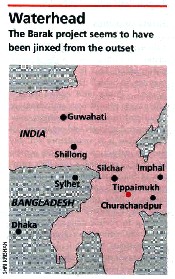Bangladesh damns Indian dam
 ASSAM's Barak valley dam project will reduce the Sylhet region of Bangladesh to a sandy waste, screams the Khaleda Zia government of Bangladesh. Given a chance, the Zia regime would have the Rs 2,000 crore multi-purpose project sink into oblivion. Bangladesh is beseeching Japan's Overseas Economic Corporation Fund (OECF) not to flush the Indian project with funds, arguing that this will ruin the Sylhet eco-system.
ASSAM's Barak valley dam project will reduce the Sylhet region of Bangladesh to a sandy waste, screams the Khaleda Zia government of Bangladesh. Given a chance, the Zia regime would have the Rs 2,000 crore multi-purpose project sink into oblivion. Bangladesh is beseeching Japan's Overseas Economic Corporation Fund (OECF) not to flush the Indian project with funds, arguing that this will ruin the Sylhet eco-system.
The Jamat-e-Islami and the Brihattara Sylhet Gana Dabi Parishad are backing Zia's latest jehad, and anti-dam green activists have been painting the streets red since December 1994. The movement is now spreading in riverine Sylhet like a prairie fire. Islamic leaders like Albai Alluddin Chowdhury are also tinging the movement with a deep green hue. The campaigners hope to mobilise international support, to help pressurize the Indian government to suspend project activities. And their efforts seem to be bearing fruits. The Brahmaputra Board, the nodal agency supervising the dam's construction, fears that oecf cash-flow may now dry up.
The Barak project seems to have been jinxed from the outset. The project aims at controlling the recurrence of high floods in the Barak valley, and generating 1500 MW of hydel power in a phased manner. But though a feasibility report was prepared as early as in 1984, barely any progress has been made so far. The Manipur state government in India is barraging the project, claiming that it might cause the submergence of 31 Hmar tribal villages in its Churachandpur district affecting 1,310 families. Tippaimukh, the dam site, is on the Assam-Manipur border.
The issue was finally settled in December 1994, at Guwahati, in Assam, when Brahmaputra Board officials and Assam and Manipur state government representatives jointly drew up a Rs 55 crore rehabilitation plan.
Board members, obviously jittery about Bangladesh's protests, are convinced that the objections are based on purely fictitious grounds. They claim that the dam would actually benefit Bangladesh. The carrot is that Bangladesh can even look forward to receiving enough water during lean periods, and actually avoid recurrent floods.
